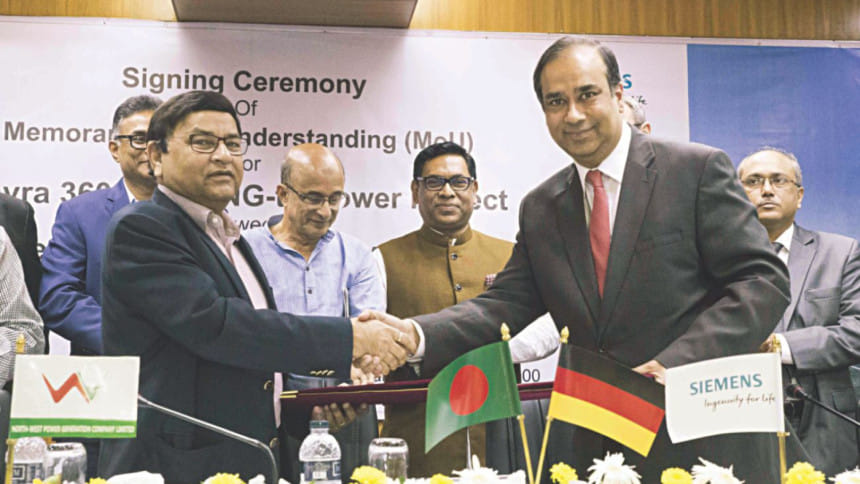Govt to build 3,600MW LNG-based power plant

Bangladesh is set to get 3,600 megawatts of electricity from a LNG-based power plant at Payra, the largest yet, as part of the government's efforts to give the economy the impetus needed to meet the growth aspirations.
North-West Power Generation Co., an enterprise of Bangladesh Power Development Board, and Siemens yesterday signed a primary agreement for setting up the plant in Patuakhali.
The estimated cost for the plant is $2.8 billion, of which $2.4 billion would come as loan and $400 million as equity, according to Power Division documents.
But Nasrul Hamid, state minister for power and energy, said the total cost would be $4 billion.
Some 20 percent of the plant's cost will be in equity that will be borne equally by North-West and Siemens. Siemens will mobilise the rest of the funds.
This will be the largest investment from Germany or any European country. Power will be brought to the capital through a transmission line, according to the Power Division documents.
A total of three power units will be set up under the joint venture, Hamid said. The first two will go into operation in 2020 and the last one in 2021.
The other LNG-based power plant, which would be between 3,000MW and 3,500MW, would be in Moheshkhali.
Work for setting up a 1,320-MW coal-based power plant at Payra is also on way and the LNG-based power plant will be built on a 100-acre land beside it.
The power plant will run on imported gas and an LNG terminal will also be set up there.
The government has taken an initiative to import a huge quantity of LNG from next year. Both land-based and floating LNG terminals will be set up.
Japanese firm Tokyo Gas Engineering Solutions Corporation has been appointed as a consultant to carry out the feasibility study for setting up the land-based terminals.
The sites being considered for the land-based terminals include Kutubdia, Moheshkhali and Payra. Each of the two land-based terminals will supply 1,000 million cubic feet of gas per day (mmcfd), according to an official of the energy ministry.
Besides, the government has approved two floating LNG terminals, each of which will supply 500mmcfd of gas.
Bangladesh is looking outside to alleviate its energy shortage largely caused by depleting domestic reserves and rising demand. Gas supply stands at about 2,700mmcfd against the demand for 3,300mmcfd.
The shortage of gas has affected power generation.
Import of 1,000mmcfd gas will cost Bangladesh $3 billion a year.
Still, the overall result is going to be positive as the import of 1,000mmcfd gas could help produce almost 5,000 megawatts of electricity, which is more than half of what the country produces today.
AM Khurshedul Alam, managing director of North-West Power, and Sunil Mathur, chief executive officer of Siemens South Asia, signed the deal at an event at the Bidyut Bhaban in Dhaka.
Tawfiq-e-Elahi Chowdhury, the prime minister's energy, power and mineral resources adviser, and Thomas Prinz, German ambassador to Bangladesh, also spoke.

 For all latest news, follow The Daily Star's Google News channel.
For all latest news, follow The Daily Star's Google News channel. 



Comments